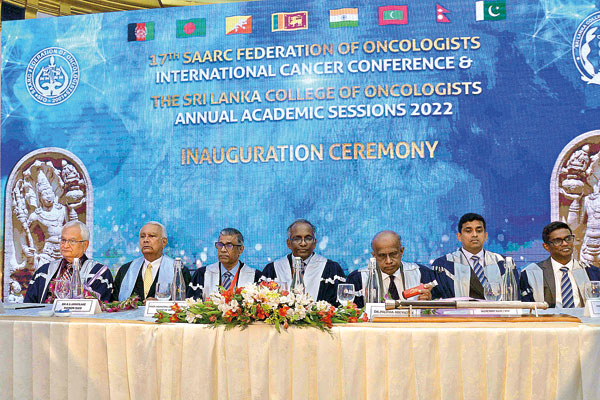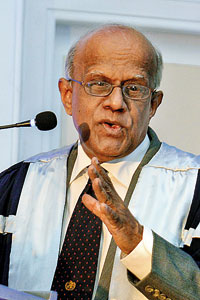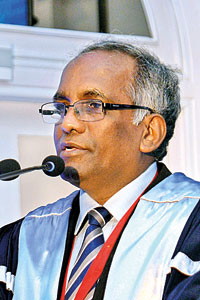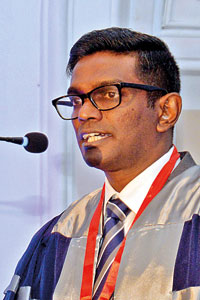News
Crucial cancer conference spreads hope amidst the gloom
View(s):
At the head table (from left) are SFO Patron Dr. Madan Kumar Piya; SLCO Patron Dr. R.S, Jayathilake; Guest-of-Honour Dr. J. Balawardane; SLCO President Dr. N. Jeyakumaran; Chief Guest Dr. Palitha Abeykoon; SLCO Secretary Dr. M. Chenthuran; and the Kumar Weerasekera Orator Dr. Sanjeeva Gunasekera
By Kumudini Hettiarachchi
It is in this backdrop that a crucial cancer conference, spreading hope was held in Colombo on the theme, ‘Converting Adversity to Opportunity’ this week, amidst a distinguished gathering from Sri Lanka and abroad.
The inauguration of the 17th International Cancer Conference of the SAARC Federation of Oncologists (SFO) was held in conjunction with the Annual Academic Sessions of the Sri Lanka College of Oncologists (SLCO) on Thursday.

Dr. Palitha Abeykoon
Addressing the concerns of many, SLCO President Dr. N. Jeyakumaran said that in the past two years with the unprecedented COVID-19 pandemic and other challenges, all their activities were disrupted.
“We need to be resilient to convert these challenges to opportunities for the sake of our patients and countries,” he urged, pointing out that there are many examples how individuals, organisations and countries in the region have done so. These success stories should be shared so that “we can learn from each other”.
Paying tribute to the SFO, he said that even amidst these challenges, it formed the ‘Women for Oncology – SFO’ incorporating members from the SAARC region, with the highlight being the ‘Global Women for Oncology’ Summit. A ‘Young Oncologists Forum’ of the SFO is being formulated and this kind of networking will result in an improvement of services, especially cost-effective quality cancer care.
“We have a tremendous responsibility,” said Dr. Jeyakumaran , adding that they are dedicated to making the region a hub where cancer is prevented if possible, diagnosed at early stages and cured with appropriate treatment or the patient’s quality of life is enhanced as much as possible.
Chilling statistics and then hope came from chief guest and international health expert, Dr. Palitha Abeykoon.
According to the World Health Organization (WHO), cancer is the second leading cause of death worldwide, accounting for nearly 10 million deaths in 2020 or nearly 1 in 6 of all deaths. Around one-third of deaths from cancer are due to tobacco and alcohol use or due to unhealthy lifestyles – high body mass index, low fruit and vegetable intake and lack of physical activity.
“This means many of them could be prevented or postponed. We have good news that survival rates are improving for many types of cancer,” he said.

Dr. N. Jeyakumaran
Moving onto the current context, he said that “we are being told that our economy will shrink by nearly 10% next year. This has made the journey to bankruptcy faster than predicted. I was in Geneva two weeks ago and what I heard from friends and colleagues was embarrassing. They think Sri Lanka is probably one of the very few countries, if not the only one recently, that declared insolvency mainly due to mismanagement and corruption. Those reposed with managing the country’s welfare seem to experiment with reckless policies that defy logic”.
Dr. Abeykoon focused on four issues Sri Lanka would need to address and some of the possible responses.
Protecting the health budget: In times of economic crisis one of the first areas to be reduced normally is the financing on health and welfare. Health should be seen as an investment. There is time to influence this thinking although I am skeptical whether we will get a positive response. The current context also merits a review of the financing functions in Sri Lanka and a look at alternative ways of financing such as more effective collection and pooling of resources for health.
The architecture of our health system:What should be the model of service delivery? In theory, any Sri Lankan can find a healthcare provider within 5-10km from where they live. Yet, in practice, gaps in the quality of investigative services, a shortage of qualified personnel and medications mean that people bypass such primary health care institutions and seek help at larger, tertiary care institutions instead. For cancer, a culture of multi-disciplinary care with proper referral pathways could help to improve the current setting.
Health Work Force (HWF) or health professionals: This is the key to most other reforms. A key to effective working of the shared care cluster reforms, is an adequately and appropriately trained and motivated HWF.
Sri Lanka is currently below the WHO recommended HWF density for nurses and allied professionals and nearly alright for doctors. How will the apparent increasing exodus of doctors and nurses due to the conditions in the country right now, affect the health sector? What can be done? These are all issues that we need to consider. It is rather perplexing that the government perhaps has not grasped the magnitude as yet or if it has, why there is only a lukewarm response?
Medicines and medical products at the centre of the on-going health crisis. While emergency supplies from other countries and development partners and donations from well-wishers are filling immediate gaps, longer term policy measures will become critical.
Cancer medicines are a case in point. In many countries, they use the Health Technology Assessment in the selection of expensive medicines. I was pleased to learn that some of your own member consultants have started looking at this area.
Here we will need a number of interventions in the pharma sector – strengthening the implementation of the Essential Medicines List and improving the supply chain, while also improving efficiency through the rational use of medicines and adopting therapeutic guidelines. We will need to increase local manufacturing capacity and apply the pricing mechanisms very diligently
Dr. Abeykoon said that colleges such as the SLCO have very important roles to play. A ‘leadership’ role to influence policy: a ‘technical’ role to provide quality services and improve the cancer literacy of the community; and an ‘advisory’ role to advise and guide policymakers and healthcare managers on the way to go. Then Sri Lanka will again be able to showcase its time-tested model of healthcare that provides good health including total cancer care that is accessible, affordable and above all, equitable and humane.
Dealing with an “important” issue, guest-of honour and Consultant Oncologist Prof. Jayantha Balawardane argued that due to a severe shortage of facilities only a few students can get into medical faculties in state universities. Others have to pay through their nose to get into a foreign university or just give up.
“It is best if we set up private universities of superior quality for local as well as overseas students. Such institutions should strictly adhere to guidelines and protocols of the Sri Lanka Medical Council (SLMC) and the University Grants Commission (UGC). This would convert Sri Lanka into a fantastic education hub for education tourism,” he said.
The sessions were held under the guidance of Dr. Jeyakumaran, SLCO Secretary Dr. M. Chenthuran and Treasurer Dr. Wasantha Rathnayake.
| Custom-made database helps with valuable insights The Dr. Kumar Weerasekera Memorial Oration on ‘Real world evidence in cancer care: A low hanging fruit, waiting to be plucked’, was delivered by Consultant in Paediatric Oncology, Dr. Sanjeeva Gunasekera attached to the National Cancer Institute (NCI), Maharagama.  Orator Dr. Sanjeeva Gunasekera Focusing on whether results of randomised control trials, considered the gold standard for generating evidence to inform standard clinical practices, could be duplicated in day-to-day practice, he said that due to a vast majority of these clinical trials being conducted in western countries, there is a high probability of “our population” being under-represented among the trial participants. Therefore, it is “essential” to supplement clinical trial evidence with real world evidence when defining standards of care for patients with cancer. This is why Dr. Gunasekera and his colleagues have created a custom-made database using the District Health Information System (DHIS) – 2 software to collect demographic, disease related treatment and outcome data for breast, colorectal and thyroid cancer at the NCI. From the analysis of 7,200 breast, 2,200 colorectal and 2,400 thyroid cancer patients enrolled in the database prospectively, valuable insights have been drawn regarding cancer epidemiology in Sri Lanka, barriers for accessing care, delays in treatment, quality of life of patients with cancer, concordance with treatment guidelines, etc. Dr. Gunasekera added: “We have prospectively tracked the availability of WHO Essential Medicine List (EML) cytotoxics. This has helped us to quantify the magnitude of the medicine non-availability problem, identify temporal trends and also possible associated factors and suggest solutions.” | |
The best way to say that you found the home of your dreams is by finding it on Hitad.lk. We have listings for apartments for sale or rent in Sri Lanka, no matter what locale you're looking for! Whether you live in Colombo, Galle, Kandy, Matara, Jaffna and more - we've got them all!

